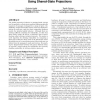Free Online Productivity Tools
i2Speak
i2Symbol
i2OCR
iTex2Img
iWeb2Print
iWeb2Shot
i2Type
iPdf2Split
iPdf2Merge
i2Bopomofo
i2Arabic
i2Style
i2Image
i2PDF
iLatex2Rtf
Sci2ools
108
click to vote
SIGSOFT
2010
ACM
2010
ACM
Realizability analysis for message-based interactions using shared-state projections
The global interaction behavior in message-based systems can be specified as a finite-state machine defining acceptable sequences of messages exchanged by a group of peers. Realizability analysis determines if there exist local implementations for each peer, such that their composition produces exactly the intended global behavior. Although there are existing sufficient conditions for realizability, we show that these earlier results all fail for a particular class of specifications called arbitrary-initiator protocols. We present a novel algorithm for deciding realizability by computing a finite-state model that keeps track of the information about the global state of a conversation protocol that each peer can deduce from the messages it sends and receives. By searching for disagreements between each peer's deduced states, we provide a sound analysis for realizability that correctly classifies realizability of arbitrary-initiator protocols. Categories and Subject Descriptors B.4...
Arbitrary-initiator Protocols | Realizability | SIGSOFT 2010 | Software Engineering | Verification Keywords Realizability |
| Added | 15 Feb 2011 |
| Updated | 15 Feb 2011 |
| Type | Journal |
| Year | 2010 |
| Where | SIGSOFT |
| Authors | Sylvain Hallé, Tevfik Bultan |
Comments (0)

